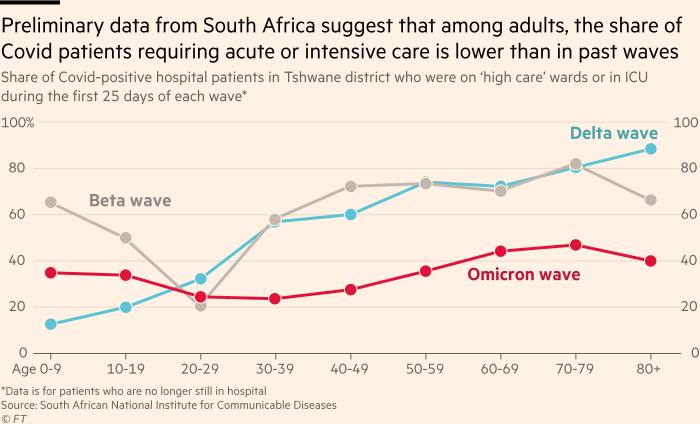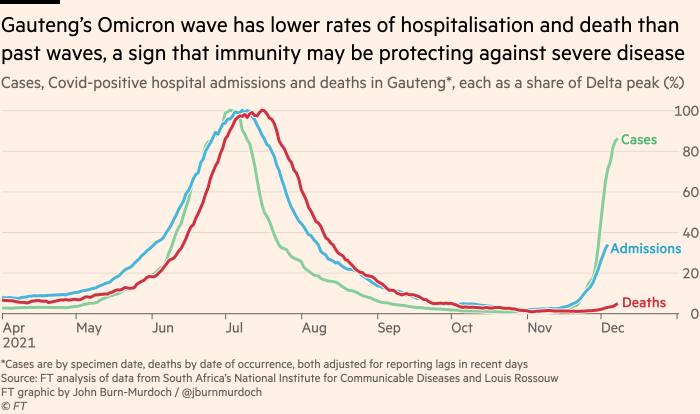South Africa has recorded fewer severe cases in the Omicron wave of coronavirus infections sweeping the country’s economic hub compared to earlier in the pandemic, according to the latest data, although the health minister said it remained early days for assessing the variant’s severity.
Just under a third of Covid patients in hospital in Tshwane, the centre of the country’s Omicron outbreak, needed specialist care or spent time in an intensive care unit in the past 25 days, compared with two-thirds in two previous waves this year, South Africa’s National Institute for Communicable Diseases said on Friday.
Four per cent of patients died, compared with a fifth in the other waves of infection, according to the data.
South Africa has a large number of prior infections from the past waves, and relatively high rates of older South Africans have been jabbed in recent months, even though only just over a third of all adults are double vaccinated.
South African scientists believe that both have been factors in limiting Omicron’s impact so far. Although initial studies suggest Omicron reduces antibody protection from vaccination or prior infection, experts are optimistic that immune defences against severe illness will be maintained.
But they have also cautioned that it will still take time to gauge the full impact of Omicron on hospitalisations because it has spread much faster than the other two variant-driven waves.

South Africa’s seven-day average of new daily cases has risen about forty-fold since the middle of November, to about 13,000 a day.
“It must be noted that severity data has several limitations at the early phase of a wave, where the numbers are small”, and because many Covid-19 patients were only found with the virus after being admitted for something else, health minister Joe Phaahla said in a briefing on Friday.
“It’s early days, but there are promising signs that largely patients, even those who are in hospital, are mild and many of them are incidental,” he added.
In recent weeks the over-60s have risen to more than 16 per cent of total admissions, from under 14 per cent, while admissions of children under five have fallen from 14 per cent to 7 per cent, according to data released on Friday.

Dr Harsha Somaroo, president of the Public Health Association of South Africa, said the emerging hospital data from the country was “reassuring”.
“The early findings suggest that [Omicron] might be milder,” said Somaroo. “In Gauteng, there is a higher level of existing immunity because we had a very intense third wave. That, coupled with immunity from vaccination, could account for some of that positive picture.”
But Somaroo stressed that “we can’t be complacent” despite reports from hospital wards indicating that length of stays are shorter, ICU admissions are less common and fewer patients are on supplementary oxygen.
“Those who have had a prior infection or vaccination are not likely to have severe disease,” said Dr Fareed Abdullah, director of Aids and TB research at the South African Medical Research Council.
But for the unvaccinated without prior infection, “the health service needs to prepare for another deluge of sick patients some of whom will be Sars-Cov-2 incidental, some of whom will have moderate disease and some of whom will have severe disease”, he said.
https://news.google.com/__i/rss/rd/articles/CBMiP2h0dHBzOi8vd3d3LmZ0LmNvbS9jb250ZW50LzBlZTc0NWNlLWFjNTUtNDZhOS05NzY2LTBiNDE5ODIxYTc5ZNIBAA?oc=5
2021-12-10 15:58:54Z
1191888452
Tidak ada komentar:
Posting Komentar